Tim Rymel's Blog, page 20
September 28, 2014
Why are We Still Trying to “Fix” Gays?
This article first appeared at The Good Men Project.
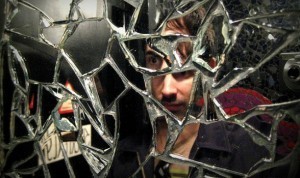 I went to see my doctor a few months ago because of recurring headaches. After running multiple tests, he determined that I had a rare blood condition that needed to be treated. We discussed available methods, but none surprised me more than his suggestion that the most effective method was leaches. That’s right. The kind you read about in early medical textbooks and see in movies from the dark ages. He said he would let these parasites suck the bad blood out and then infuse me with new blood. He was convinced that this was the best, and most effective, method for treating this condition.
I went to see my doctor a few months ago because of recurring headaches. After running multiple tests, he determined that I had a rare blood condition that needed to be treated. We discussed available methods, but none surprised me more than his suggestion that the most effective method was leaches. That’s right. The kind you read about in early medical textbooks and see in movies from the dark ages. He said he would let these parasites suck the bad blood out and then infuse me with new blood. He was convinced that this was the best, and most effective, method for treating this condition.
After doing my research, and getting a second opinion, I came to the conclusion that this doctor should never be allowed to practice medicine in the state of California, where I live. I wondered where he got his license and why it hadn’t been revoked
My story is not only untrue, it’s ridiculous.
♦◊♦
The fact is, we would never allow someone to practice medicine on people with such barbaric methods, based on an antiquated and debunked hypothesis. Furthermore, we know for a fact that treating someone with leaches simply does not work. It’s never worked. Any medical doctor who tried to do so today would lose his license and possibly be required to undergo a mental evaluation.
The fact is, we would never allow someone to practice medicine on people with such barbaric methods, based on an antiquated and debunked hypothesis.
Yet, in most states, mental health professionals are allowed to do something very similar. They are allowed to practice reparative therapy, an attempt to change a person’s sexual orientation from gay to straight. Of note, reparative therapy is never used to change someone’s sexual orientation from straight to gay. The practice is almost exclusively tied to conservative, religious organizations, as are the therapists who perform it. Reparative therapy is sometimes referred to as conversion therapy, the ex-gay movement, or more academically, sexual orientation change efforts (SOCE).
♦◊♦
Why try to change someone’s sexual orientation?
The idea behind reparative therapy is that homosexuality is unnatural, not God’s design or God’s best for the men or women who experience it. This concept of “unnatural” didn’t start with the church. The idea that homosexuality was something to be “fixed” originated around the turn of the century with Sigmund Freud. Freud is considered the father of psychoanalysis, whose many theories revolved around psychosexual stages. Homosexuality was a new term, and a relatively new concept in the late 19th century.
Freud’s view of homosexuality changed over time and he is noted as eventually stating, “Homosexuality is assuredly no advantage, but it is nothing to be ashamed of, no vice, no degradation; it cannot be classified as an illness; we consider it to be a variation of the sexual function, produced by a certain arrest of sexual development” (Freud, Sigmund, “Letter to an American mother”, American Journal of Psychiatry, 107 (1951): p. 787)
This idea of “arrested sexual development” was believed to be true for half of the 20th century, until psychologist Evelyn Hooker conducted the first study on gay men, in the 1950’s, who were not already seeing therapists for other mental health issues. Her research discovered that there was no difference in intellect, emotional or psychological well being between heterosexuals and homosexuals. Several years later, in 1973, through a series of events, the American Psychiatric Association removed homosexuality as a mental disorder from the Diagnostic and Statistical Manual (DSM). (Read more about the facts about homosexuality and mental health.)
♦◊♦
What do we know about the effects of reparative therapy?
Dr. Douglas Haldeman, in 1991, noted that, “…empirical studies fail to show any evidence that conversion therapies do what they purport to do: change sexual orientation” (p 149). In 1990, Bryant Welch, then executive director for professional practice said, “research findings suggest that efforts to ‘repair’ homosexuals are nothing more than social prejudice garbed in psychological accouterments” (ibid p 150). Based on research from Faustman, 1976, McConaghy, 1981 and Rangaswami, 1982, Haldeman said, “Individuals undergoing such treatments do not emerge heterosexually inclined; rather, they become shamed, conflicted, and fearful about their homosexual feelings (Ibid p 153).
There have been several studies and reviews of research over the last 40 years that unequivocally prove a person’s sexual orientation cannot be changed.
There have been several studies and reviews of research over the last 40 years that unequivocally prove a person’s sexual orientation cannot be changed. Dr. Lisa Diamond, the foremost expert on sexual fluidity – being attracted to, one at a time, one sex and then the other – has clearly stated that she has never seen a person’s sexual orientation change in all her research. In a personal conversation, she told me she has seen it expand, but never reverse.
However, fringe groups like NARTH, the National Association for Reparative Therapy of Homosexuality, and ex-gay religious organizations, such as Restored Hope Network, refuse to acknowledge this research, frequently picking and pulling only what they want to use to substantiate their purely religious point of view.
To be clear, the practice of reparative therapy has been condemned by these groups:
The American Academy of Pediatrics
The American Counseling Association
The American Federation of Teachers
The American Medical Association
The American Psychiatric Association
The American Psychological Association
The Interfaith Alliance
The National Association of School Psychologists
The National Association of Social Workers
The National Association of Secondary School Principals
New Ways Ministries
The People for the American Way (and last but not least)
9 former ex-gay ministry leaders and founders.
Sadly, the LGBT community continues to be used as fodder by the political and religious right. This summer, the Texas Republican Party chose to include reparative therapy as part of its political platform. The environment for today’s young LGBT person growing up in a conservative Evangelical Christian home has not changed much in the last 40 years. I was one of those kids and it took me nearly 25 years to realize there was nothing wrong with me after all.
Only two states, California and New Jersey, have outlawed the practice of reparative therapy for minors.
Only two states, California and New Jersey, have outlawed the practice of reparative therapy for minors. The National Center for Lesbian Rights (NCLR) has been leading the #BornPerfect campaign to put a stop to the practice. Samantha Ames, a NCLR staff attorney, was quoted in Buzzfeed as saying, “Two years ago, we could barely get people to believe that conversion therapy is still going on in the United States, but these laws are seeing momentum now.”
♦◊♦
What can you do to help?
Raise awareness and be vocal about stopping the practice in your state. For more information, contact the National Center for Lesbian Rights.
Where can you go if you need help?
If you are an ex-gay survivor, there are resources available at BeyondExGay.com, as well as, TimRymel.com/Resources. If you’re interested in connecting with other ex-gay survivors, contact me Tim@TimRymel.com.
For more information, see Author Bill Prickett’s article “How to listen to an Ex-Gay Testimony.”
Let me know what you think!
Tim
Hire Tim to speak at your event
The post Why are We Still Trying to “Fix” Gays? appeared first on Tim Rymel.
Why are We Still Trying to “Fix” Gays? (Via the Good Men Project)
Click here to view the article on the Good Men Project
Hire Tim to speak at your event
The post Why are We Still Trying to “Fix” Gays? (Via the Good Men Project) appeared first on Tim Rymel.
September 25, 2014
When Parents are Forced to Choose Between Their LGBT Child and Their Church
This article first appeared at The Good Men Project.
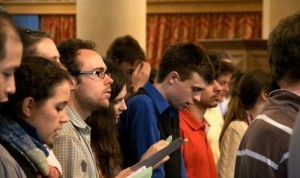 I couldn’t believe what my friend was saying to me. I’d known her for years and she knows I’m gay. She had been one of my biggest supporters. Now, sobbing on the other end of the phone after finding out her own child was gay, she was saying things like, “What did I do wrong?” “Can I fix this?” and “What will people think of me when they find out?”
I couldn’t believe what my friend was saying to me. I’d known her for years and she knows I’m gay. She had been one of my biggest supporters. Now, sobbing on the other end of the phone after finding out her own child was gay, she was saying things like, “What did I do wrong?” “Can I fix this?” and “What will people think of me when they find out?”
I was caught off guard and couldn’t help but wonder, Is this what she truly thinks of me? I’m broken? That I should be ashamed and embarrassed? It was the first time I realized how intrinsic homophobia is built into our culture. It’s no wonder some parents react the way they do.
◊♦◊
We’ve all seen the videos on social media. The “good Christian parents” attack their children, call them names, and swear at them. “In the name of God” they tell their children they will no longer support their wicked “lifestyles.” These parents throw them out, disown them and truly believe it’s what God would have them do.
It’s a sad fact that of the estimated 1.6 million homeless youth, around 40% are lesbian, gay, bisexual or transgender. One study found that, “the risk of attempting suicide was 20% higher among sexual-minority youths in less-supportive environments” (Duncan & Hatzenbueler, 2014, p 272).
And then there are the other parents; the ones who want to do the right thing at all costs. Yet, as enlightened as they may or may not feel prior to their child’s disclosure, they suddenly find themselves fearing for their child’s safety. They mourn the loss of a parents’ dream and are quickly forced to choose between their church families or their children. The pain is very real, intense, and often unexpected.
◊♦◊
“I was always very vocal around the house about supporting gay rights and calling out nastiness when I heard it,” one mom told me. “So I was not that surprised when our daughter came out to us at 14. What did surprise me was how thrown for a loop I was.”
Our two sons came out to us on a three-way phone conversation. I said to them I was concerned for their souls. My husband said they were breaking his heart
“I was so afraid for her,” she continued. “Afraid for her physically, realizing that not only did I have to be concerned about all the threats that just being a woman in our society poses, but double that for being gay. I was afraid for her emotionally; it can’t be easy being a gay teen in our community.”
She discovered that her fears didn’t stop there. Like many parents, she realized the refuge she once found in a church community became a place of hostility.
“We stopped going to church to avoid the chance that she might be hurt even by glances or whispers,” she told me. “And I still can’t bring myself to attend any church that would not lovingly accept my daughter as being as perfect as God made her. This has been the biggest loss, the loss of a church community. I refuse to be part of an organization where my child is not welcomed.”
◊♦◊
Another mom from Long Island said, “Our two sons came out to us on a three-way phone conversation. I said to them I was concerned for their souls. My husband said they were breaking his heart. We spoke with my husband’s priest and my pastor. They basically said: ‘Tell your children God loves them and you love them, but they will be living in a sinful state if they are in a relationship.’ I could not eat and lost 10 pounds in a very short time.”
She said she found some “horrible, horrible things some evangelical pastors said that convinced me they could not possibly be speaking for God.” So she read books, found information on blogs and came to the conclusion, “I believe my children were born Gay. God is fine with that and so am I.”
◊♦◊
“I believe my children were born Gay. God is fine with that and so am I.”
Even while accepting other people and their gay children, the impact of having a gay child of one’s own is a different story, according to Nancy, who lives in Southern California. “When my child came out I will admit I was heartbroken,” she said. “The initial reason for my heartbreak was I knew my child would be treated badly. Attending a Christian High school and Christian College, they could not be who they really are for fear of being kicked out or fired from their jobs. Then thinking further down the line, no biological grandchildren or ‘traditional’ wedding were just a few of my thoughts. It was not the future I had envisioned for my child. Having said that, in the grand scheme of life, those things are not as important as my child feeling loved and valued.”
I lost many friends and I no longer attend that church. That was a huge heartbreak to me, to find out how ugly people could be.
Nancy went on to say, “The very few people I lost were from conservative Evangelical backgrounds.” That, as it turns out, seems to be a common theme.
“The church we attended blamed me for [my son] being gay,” said Harriet Miller of Lookout Mountain, GA. “They even sent my husband and me away to two different Christian counseling centers. I lost many friends and I no longer attend that church. That was a huge heartbreak to me, to find out how ugly people could be.”
◊♦◊
Dawn Bennett, of Nashville, TN, and the author of the soon-to-be released book Loving Pearl, said, “I’m a Christian. I have been my entire life. When [my daughter] Pearl came out at church, we were not contacted by the youth pastorate staff. Instead, she was told she could be taken through a ‘sin breaking’ class to be saved from that most awful sin in her life… Ultimately, we did leave that church and to this day my daughter does not attend.
‘How well did you love my people?’ To that I hope to be able to say, ‘As best I could while excluding no one.’
The solace many of these parents found came with the resolve, as it did with my friend, to take a second look at their faith, instead of their children. In the process each of them stated they found deeper meaning in life, in love, and in family.
Bennett went on to state, “…my goal in this whole journey is to be able to answer the question I believe God will ask me at the end of my life, ‘How well did you love my people?’ To that I hope to be able to say, ‘As best I could while excluding no one.’”
◊♦◊
For more information on supporting your LGBT child or loved one, go to PFLAG.org.
—
Photo: Flickr/Jimmy and Sasha Reade
Let me know what you think!
Tim
Hire Tim to speak at your event
The post When Parents are Forced to Choose Between Their LGBT Child and Their Church appeared first on Tim Rymel.
When Parents are Forced to Choose Between Their LGBT Child and Their Church (via The Good Men Project)
Hire Tim to speak at your event
The post When Parents are Forced to Choose Between Their LGBT Child and Their Church (via The Good Men Project) appeared first on Tim Rymel.
September 20, 2014
How to Listen to an “Ex-gay” Testimony, Guest blog by Bill Prickett
This is one of the most important blogs I think I’ve ever posted on the topic of ex-gay. Former ex-gay leader and author Bill Prickett concisely, accurately and articulately addresses what to listen for when someone claims to be ex-gay. Please like and share this important message. – Tim Rymel
It’s no secret that I believe “ex-gay” (reparative) therapy is bogus and dangerous. Regardless of my very clear position, people will regularly send (unsolicited) “personal testimony” videos, accompanied by a statement like: “Well, how do you explain this person’s wonderful change?”
Note: For the record, I don’t like to question anyone’s personal experience. It’s their experience, not mine. You tell me you were healed when Jesus appeared to you on a piece of toast? I say, Amen. You insist that God speaks to you through your Shar Pei? I respond: Hallelujah!
I will reserve my opinion…right up until you insist that your experience is THE pattern all others must follow. (i.e., God only speaks through small dogs!)
One of my chief problems (it’s difficult to boil down my problems to just one) with these testimonies is they rely solely on self-reporting, and therefore are unverifiable. While I appreciate the motivation to share the Good News of God’s work in their life, there’s still the issue of proof. It’s not that I’m calling them liars; I’m sure they are very sincere…but I think they’re sincerely wrong!
Let’s be honest, I can make any kind of claim: “I have overcome my cravings for the tasty delights of chocolate. I never even think about eating a luscious Snickers bar.”
Without the aid of ESP or Vulcan mind-melding, finding my well-hidden stash, or catching me with caramel hanging out of my lips, there’s no way to contradict the veracity of my candy victory testimony.
Over the years, I’ve detected revealing patterns in these testimonies that only reinforces my hardcore conviction that sexual orientation cannot be changed. As you listen to someone who claims they changed from gay to straight, please don’t take the declaration at face value, even though the person might be an earnest Christian. Ask these questions:
1. Do they have “lingering” sexual desires or temptations?
No matter what else is claimed, when I hear someone confess they still have those “desires,” it’s Game Over in my mind. They can call themselves “ex-gay,” “former gay” or healed or cured or whatever, but they are…overstating. I’ve heard “ex-gays” who still “struggle” after 10-15 years. Shouldn’t that tell us something?
2. Are they confusing behavior with orientation?
It’s one thing to say “I am no longer sexually active,” but it’s something else to say “I am no longer gay.” If a homosexual never has sex, that doesn’t make them straight; they are merely a celibate homosexual. Let’s not confuse discipline and willpower with an actual change in orientation.
Note: There’s a similar problem when erroneous evidence is presented, such as “I am now married, with a family.” Getting married is a choice, not proof of sexual orientation.
3. Is this simply a contrast of extremes?
Often the person will give shocking details about their former life—sexual promiscuity, alcohol or drug abuse, stealing, hustling, pornography, etc. Then something intervened. Maybe a life-changing religious conversion. Perhaps a 12-step program. We can applaud the miraculous improvements in their life now, but it’s not the same as a change in sexual orientation.
4. What “tense” is being used?
Many ex-gay groups practice “positive confession,” the premise that we say what we want…as if we already have it. Instead of saying “I want to be free of my homosexuality,” I confess “I am free of my homosexuality!” Rather than admit “I’ve asked God to heal me of these desires,” I proclaim “I am healed, in Jesus’ Name.” It’s actually “future perfect” tense, using present tense phrasing—grammatically incorrect, as well as factually misleading.
5. Are they employing accurate terminology?
Statements like “I’ve rejected the gay lifestyle” could mean anything. (Or nothing, since “lifestyle” is not a accurate description of what it means to be gay.) Another common one is “I turned my back on homosexuality.” That’s vague, and is not the same as a change in sexual attraction. (It’s like saying “I dyed my hair, and turned my back on being a red-head?”)
6. Do they have adequate credentials?
Those who talk about the methods required to go from gay to straight are generally not medical or mental health professionals. Most often, those who lead “ex-gay” groups are those who’ve been through the program themselves, with little additional training.
Likewise, those who insist the Bible is “absolutely clear” are typically not theologians. Unfortunately, that doesn’t prevent them from speaking authoritatively as if they were. In point of fact, there is disagreement about what the Bible says about homosexuality; it’s not as black-and-white as some would purport. There is also no consensus about the cause of homosexuality, though reputable professionals know it’s not a choice. (Every major professional medical and mental health organization has come out against reparative therapy.)
7. What is the timeline?
We know that sexual orientation is complex, so be wary of simplistic, quickie methods for “cure.” (“I prayed about it, and God took away my desires.”) In addition, often the person speaking has only been living this new “ex-gay” experience for a short time. It’s like someone who recently lost a significant amount of weight; they’re excited and convinced they will never gain back the weight. But what happens six months or a year…or ten years down the road?
For me, after 30+ years of monitoring the “ex-gay” movement, none of the testimonies have swayed my beliefs that sexual orientation is innate and unchangeable. I’ve been called skeptical, but I prefer to think of it as…weathered. (Okay, cynical!) My advice: when you listen, try to hear what’s not being said. Separate what’s actually true and what is wishful exaggeration.
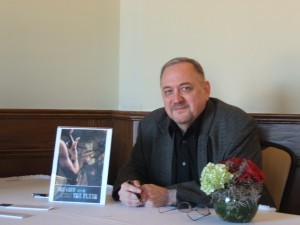 Bill Prickett is the author of two novels, The Mind Set on the Flesh and Sow the Wind, Reap the Whirlwind (available at Amazon.com). He is a former “ex-gay” and ex-gay leader. For more information, visit his website, BillPrickett.com.
Bill Prickett is the author of two novels, The Mind Set on the Flesh and Sow the Wind, Reap the Whirlwind (available at Amazon.com). He is a former “ex-gay” and ex-gay leader. For more information, visit his website, BillPrickett.com.
Join in the conversation by leaving comments below.
The post How to Listen to an “Ex-gay” Testimony, Guest blog by Bill Prickett appeared first on Tim Rymel.
September 16, 2014
A Drag Queen for Jesus
This article first appeared at The Good Men Project.
 When my mother was caught wearing pants at home (a pantsuit) in the 1960s by members of our small, Pentecostal congregation, the pastor swiftly chastised her for putting on “men’s clothes.” When Jason DeShazo decided to don high heels, lipstick and a wig, his Pentecostal pastor (also his father) became his biggest supporter. My, how times have changed.
When my mother was caught wearing pants at home (a pantsuit) in the 1960s by members of our small, Pentecostal congregation, the pastor swiftly chastised her for putting on “men’s clothes.” When Jason DeShazo decided to don high heels, lipstick and a wig, his Pentecostal pastor (also his father) became his biggest supporter. My, how times have changed.
◊♦◊
DeShazo, 35, found a way to minister to a segment of the underserved gay population. “I’ve always had a heart for the trans[exual] and drag communities,” he said. “They have kind of been forgotten by the LGBT church movement. We’ve accepted them, but we didn’t know what to do with them.”
DeShazo knows a thing or two about finding acceptance. Raised in a conservative Pentecostal Church in rural Florida, he knew at a very early age he was gay. He contacted Exodus International, when he first came out, to attempt to change his orientation. It was something he initially thought he needed to do.
At the time, Exodus International was at the heart of the ex-gay, or reparative therapy, movement. It was the mid-90s and the war between the Christian conservatives and the LGBT communities was virulent and heated. “At that point,” DeShazo said, “I just suppressed things and really kept it between me and God.”
DeShazo faithfully attended youth group outside of his small, hometown congregation and began working in street ministry. It was there that he fell in love with performing. He saw how the use of drama and mime impacted people’s lives in a positive way. “I would bring it back to my own congregation but it wasn’t really accepted,” he said. Instead, the congregation made it very clear to DeShazo that attempting to use such “worldly antics” was something of which neither they, nor God, would approve.
DeShazo knew he wanted to serve God, but the disapproval from his church and the pressures of his own struggle between his faith and sexual orientation all but led him in that direction. “I wanted to trust the people in my life who were my spiritual leaders. I went for deliverance, trying to do everything I could do, but things weren’t changing,” he said.
◊♦◊
By the time he reached age 20, however, he came to terms with his sexuality and faith. Through it all, DeShazo says he knew God was saying, “Hey, I love you. This is how I created you. You need to walk this path.” His father, realizing that DeShazo was gay at a very young age, also came to terms with his son’s sexual orientation, even telling him, “I see God in you and I know the call. I know the God you serve is the same God that I serve.” DeShazo’s father has since preached alongside his son in prison ministry settings and churches.
When DeShazo met some drag queens and transgendered people while living in Tampa, he was immediately drawn toward the idea of performing drag himself. “It was a cool way of entertaining and bringing joy and laughter to people,” he said. His drag persona, Momma Ashley Rose, was born.
However, after performing a few times and getting to know more people, DeShazo saw the seedier side of the entertainment industry, which included drugs and alcohol. “I started to see it happen and it creeped me out,” he said. Still working out the details of his faith and commitment to God, he knew that was something he didn’t want to be a part of. DeShazo hung up his heels and took a hiatus from the drag scene.
“At that point I really focused even more on my faith,” he said. “I had moved to Atlanta and found a wonderful church where I began to minister.” Knowing that God had a call on his life, DeShazo was leading the arts ministry. This time, he was allowed to use the creativity he had longed to use in his home church as a teenager, and incorporated plays, dances, flags, and other types of expressive worship.
Through a connection to a church in Southern California, DeShazo, and his partner, moved to Long Beach, where his creative arts ministry would expand. “We met some amazing people out there and started working with the LGBT Center,” he said. The center was in desperate need of finances at the time and that’s when the pastor of the church suggested DeShazo revive his role of Momma Ashley Rose.
“We did this whole fundraiser for the LGBT youth center and raised quite a bit of money. At that point I really began to feel a call that God had been leading me to the drag and trans[exual] communities as a way of just loving them,” DeShazo said. But it didn’t stop there. “I felt that my call wasn’t just to the gay community, that I needed to expand the entertainment side of the ministry and I began to do fundraisers for food pantries, soup kitchens and any type of outreach to build bridges to the community.”
Unlike many adult drag shows, Momma Ashley Rose’s show is family-friendly and God-centric. “For people who feel that they have been rejected or unloved, for whatever reason, I want to let them know that somebody, somewhere loves them.” It’s a simple message embedded with deep meaning among a population frequently banished, not only by a church culture, but sometimes from within the LGBT movement itself.
◊♦◊
DeShazo certainly isn’t without his critics. “Even as Momma Ashley Rose I get responses like, ‘How dare you shove it down my throat,’ but I don’t. Or, I’ll get, ‘How dare you call yourself a Christian and be gay.’” DeShazo says, “I try not to use the term ‘Christian’ too much. I’m a believer in Jesus.” Christian, he says, can carry a negative connotation in society, especially among those in the LGBT community.
Undeterred, DeShazo believes that the path he is on is one that God has laid out for him. “When I step on stage, I just feel a little bit of God. Something in my life is shining out.” He says he never lashes out at those who disagree or misunderstand him, nor does he go down the rabbit hole of fruitless discussions, which lead people on Scriptural tangents and dogmas. DeShazo remains dedicated and determined. “My whole goal and focus is to let people know they loved, they are accepted and they are wanted.” That is the message of Momma Ashley Rose, and the ultimate message of the Gospel DeShazo delivers.
For more information visit MommaAshleyRose.com.
— Photo courtesy of Momma Ashley Rose
Let me know what you think.
Tim
Hire Tim to speak at your event
The post A Drag Queen for Jesus appeared first on Tim Rymel.
A Drag Queen for Jesus (via The Good Men Project)
Hire Tim to speak at your event
The post A Drag Queen for Jesus (via The Good Men Project) appeared first on Tim Rymel.
August 23, 2014
What It Means to be a Truth Seeker
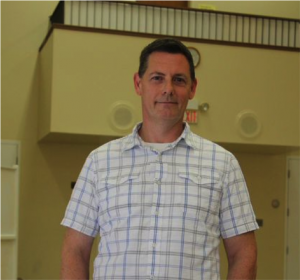 I was quoted in a Buzzfeed interview as saying, “I’m not even sure God exists.” I could hear the collective gasp from my former evangelical friends and ministry co-workers. I’m pretty sure that statement alone, never mind the rest of the story, moved me to the top of their prayer lists. But let me explain.
I was quoted in a Buzzfeed interview as saying, “I’m not even sure God exists.” I could hear the collective gasp from my former evangelical friends and ministry co-workers. I’m pretty sure that statement alone, never mind the rest of the story, moved me to the top of their prayer lists. But let me explain.
I’m a skeptic. I always have been, even when I claimed the Christian label. I approach life wondering how things work, why they work that way, and what it all means. Unfortunately, I didn’t get the memory to go with it, so if I take something apart I can never remember how to put it back together. In my house, anything that breaks with more than three parts (including the batteries) gets replaced, thrown away, or goes to a mechanic.
Life is complex and intricate. Most of it remains unknown. Even the physical world, in which we live, is vastly unexplored. The human mind, whether created or evolved, is capable of loving, hating, and leading us to commit atrocities or unimaginable kindness. We are more often convinced by emotion than evidence. If we contemplated all of our inconsistent beliefs and actions, we’d go mad. So our brains automatically make adjustments for us so we can sleep at night. It really is amazing.
Where is God in all of this? I don’t know. Perhaps He is not in there at all. Perhaps He is the ultimate consciousness that ties it all together. Perhaps He is the energy that keeps it moving, or perhaps He is the master orchestra leader paying meticulous attention to the details. It’s all a matter of faith, isn’t it? No one can say with any certainty, in spite of his or her best felt conviction.
What I find most intriguing is that a majority evangelical Christians believe God is transcendent above physics, science and the natural world, but don’t believe for a moment that He is capable of doing anything outside their understanding of a two thousand year old, 66-chapter book. They have trapped Him in their proverbial genie’s bottle of Scriptures, rubbing the magic lamp, as it were, whenever they want Him to grant their wishes.
That doesn’t make any sense to me.
If God is God, no one will ever be able to figure Him out, nor contain Him, nor second-guess Him, nor presume to “know” Him, and certainly not presume to know someone else’s relationship to, or with Him. As I have often said, we are finite human beings in an infinite world.
Whenever we become convinced of our beliefs, we have left the uncertainty of faith and crossed over into the certainty of religion. We have entered the realm of man-made precepts, cultural ideals and moral laws. We presume to speak on behalf of God, forcing others to uphold our ideals, our understanding of God and our formula for serving, pleasing and appeasing God. Otherwise, we believe, God will bring unimaginable judgment upon everyone if we – and they – don’t do it the “right” way.
I refuse to play the game.
 With 33,000+ sects of Christianity alone, including what most evangelicals would consider the apostate teachings of Mormons and Roman Catholics, there are nearly as many interpretations of the Bible as there are people. Speaking as a professional instructor, if this were a corporate training program and God were the CEO, this would be a colossal failure.
With 33,000+ sects of Christianity alone, including what most evangelicals would consider the apostate teachings of Mormons and Roman Catholics, there are nearly as many interpretations of the Bible as there are people. Speaking as a professional instructor, if this were a corporate training program and God were the CEO, this would be a colossal failure.
I am a truth seeker. I am not intimidated by information that contradicts what I believe to be true. I am open to learning, changing and making adjustments. I learn from the experiences of others and value their wisdom. This allows me to accept people where they are and show compassion without placing judgment on them. I don’t feel the need to change them or correct them. In fact, I may learn something I didn’t know before. Living in the uncertainty of faith allows me to live authentically, love more freely and give without any expectations.
If God exists, I believe He seamlessly embodies love, acceptance, forgiveness, compassion and grace. He shows Himself in humanity through every act of kindness, every gentle touch and through words of encouragement. He exhibits His power when we stand against poverty, injustice and unfair treatment of those who have been disenfranchised and marginalized. Just as Jesus instructed. When human beings are treated with dignity, respect and fairness, He is exalted. My life of praise is not found in a three-cord song, or a pithy lyric, but in the way I treat others.
If God is God, He is above culture, religion, politics and human understanding. He is not threatened by incongruent beliefs, cognitive dissonance, or our inability to comprehend or believe in Him. Human morality does not change His nature, surprise Him, scare Him or send Him into a panic.
If God is all truth, then as a truth seeker, I am a follower of God.
Tim
Please share your thoughts below.
Hire Tim to speak at your event
The post What It Means to be a Truth Seeker appeared first on Tim Rymel.
August 19, 2014
Winning the Battle and Losing the War
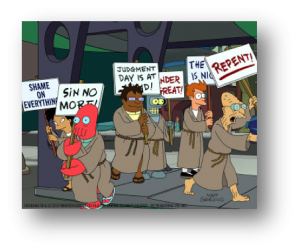 I messed up. Someone sent a message after hearing me on a radio show and said I should ask Jesus into my heart and repent of my “debased lifestyle of homosexuality.” I reacted. Actually, I overreacted.
I messed up. Someone sent a message after hearing me on a radio show and said I should ask Jesus into my heart and repent of my “debased lifestyle of homosexuality.” I reacted. Actually, I overreacted.
For a few days I justified my behavior. This person made a ton of assumptions about me, dismissed my journey, and talked down to me, as if he were spiritually superior. Besides, I reasoned, at least I was doing something to better the lives of others instead of making snap judgments and condemning people to hell.
In reality, I was hurt. I’d like to think I’m above being hurt, but the journey out from under the long arm of evangelical fundamentalism is a long one. Though some friends have made the journey as well, many more friends and family have not.
I made assumptions about this person and his statement towards me. I didn’t pursue him by asking questions, or discovering the human being behind the statement, I just went off. It’s easier and faster to go off on people than face our own wounding and show compassion. But isn’t that what we’re asking of others? Get to know us? Show compassion?
As a recovering fundamentalist I think I have a pretty good grasp on what evangelicals believe and think. I would have made a similar statement a couple of decades ago and felt I was doing so out of love and concern for the person’s soul. It’s very hard to maintain that perspective on the other side of this issue now.
To make matters worse, we quickly take sides, congregating among ourselves and building community, not based solely on support, but to lash out at our perceived enemies. We pat ourselves on the back for clever quips meant to penetrate and break the spirit, not the mind. In the process, we allow ourselves to become victims of our own choosing. “Look what she said to me!” We proclaim, strengthening an army, but losing our humanity.
As an educator, I understand where perceptions and belief come from and how and why people react the way they do to hot topic issues. But just because I understand, doesn’t mean I’m above being hurt and overreacting. I have to consciously choose thoughtful self-control. Sometimes, my emotions get the best of me. That’s OK, too. I extend myself the same grace I try to give others. I even allow myself to rant and rave to a loved one with whom I feel safe, while I figure out a more appropriate response. The safety of loved ones cannot be overrated.
There are certainly those out there whose only purpose is to crush a segment of the population they don’t understand. Among them are those who want to love, but don’t know how. It is difficult to tell the two apart. Many of us have been hurt. Some have been victims of physical violence, brutal attacks and blatant hatred or discrimination. Who could blame us for fighting back? At the end of the day, we’re human beings with emotions.
Winning a war is a strategic process. It involves thought, planning, understanding the opposition and self-control. Winning a battle, however, requires brute force, bigger weapons, more ammunition and a little luck. There is need for both in the process of social change, but we have to be able to tell the difference between the war and an insignificant battle of wits.
Tim
Please share your thoughts below.
Hire Tim to speak at your event
 Tags: Christian and gays, Evanglical Christianity and gays, human rights, LGBT
Tags: Christian and gays, Evanglical Christianity and gays, human rights, LGBTDel.icio.us


TweetThis

Digg

StumbleUpon

Comments: 0 (Zero), Be the first to leave a reply!You might be interested in this:
 Guest Post: To Christian Parents of Gay Children, by Susan Cottrell
Guest Post: To Christian Parents of Gay Children, by Susan Cottrell Can You Show Compassion without Compromise?
Can You Show Compassion without Compromise? Keeping Up Appearances
Keeping Up Appearances The Gift of Deconstruction
The Gift of Deconstruction Truth or Dare (to Love)Copyright © Tim Rymel [Winning the Battle and Losing the War], All Right Reserved. 2014.
Truth or Dare (to Love)Copyright © Tim Rymel [Winning the Battle and Losing the War], All Right Reserved. 2014.The post Winning the Battle and Losing the War appeared first on Tim Rymel.
August 10, 2014
Guest Post: To Christian Parents of Gay Children, by Susan Cottrell
I’m excited to publish an important and popular post by guest blogger and Author of “Mom, I’m Gay,” Susan Cottrell. Susan and her husband, Robert, live in Austin, Texas and are founders of FreedHearts Ministries, an organization that helps parents love and accept their LGBT children, without losing their faith.
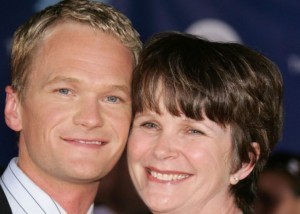 You want to shove those words back in and put the lid on. But you can’t. Your child is gay. This goes against everything you’ve been taught. It was not what you had in mind, and you instantly wonder where you went wrong.
You want to shove those words back in and put the lid on. But you can’t. Your child is gay. This goes against everything you’ve been taught. It was not what you had in mind, and you instantly wonder where you went wrong.
When you become a parent, you know to expect the unexpected. But for many Christian parents, nothing can prepare them to hear that their beloved child is gay. This is the child you have cradled, spoon fed mashed bananas, and dreamed a beautiful future for. How could this be? What will the church say? What will your friends say? What does the future hold? You can’t even get your head around this.
If you are a Christian parent, family member or friend to whom your loved one has come out as gay or lesbian, then this is for you. I invite you to sit down, relax, maybe get a cup of tea, and soak in what I’m about to tell you. My hope is to guide you as we walk for a bit through this maze of confusion, to help you find your way to wholeness.
In most Christian circles, this is not good news, and you may begin to spiral into reflection and self-searching. We’ll get to that. But at the bottom of it all, this is not about you. Most parents’ first mistake is to make it about them instead of about their son or daughter. So let’s talk about some of the major stumbling blocks for Christian parents.
1. This is not an offense against you. This is not something your child did to you. They did not “choose gayness” to rebel against you, get back at you or make your life miserable. In fact, it really has nothing do with you. You did not cause this; it’s not a failure on your part. As a younger Christian, taught that homosexuality is a sin, I believed that trauma somewhere in someone’s past caused homosexuality, even if they didn’t remember it. To my surprise, God completely shifted my understanding and revealed to me the many people who had a great childhood and are still gay. He also reminded me of the many straight people who had traumatic childhoods, yet remained straight. Your expectations may lay shattered at your feet. But those are your expectations for your child. Quite simply, they may not be God’s expectations. Ask God to replace your vision for your child with His.
2. This orientation is not news to your child. They likely did not tell you the first time they noticed their same-sex attraction. In fact, they have probably lived with this quite a long time. They had to discover how true it was. They had to watch other young teens grow into puberty, and realize they weren’t developing the same feelings. Perhaps they dated the opposite gender to see if passion might develop, and yet none did. By the time they come out to you, they are pretty sure of what they’re saying. You may have to work through a slate of brand new emotions about this, and your emotions will affect them, but theirs are not brand new. Do not ask them if they are sure, if maybe they want to take a little time and see what happens. Instead, consider the journey they have been through. Ask them things like, “When did you know?” “How long have you felt this way?” and tell them how you are grateful that they are including you, that they don’t have to go through this alone anymore.
3. Now is a key time to embrace your child. Imagine for a moment the courage it took to tell you about their sexuality, especially when they know it seems to contradict your core beliefs. In this moment, your child needs to know he did the right thing by telling you. You may flood with fear, doubt, anger, grief, disappointment, shame, anguish or guilt, but do not let those hinder you from expressing your unconditional love and admiration for your child. Your child will have their own list of emotions to deal with; don’t hand them yours. Give yourself time to process all of your own emotions. Be kind to yourself and your child through this.
4. They were terrified to tell you. The risk they took is very real. Some gay teens have been shamed, banished, threatened, beaten, and shunned. They know that once it is said, it cannot be unsaid. They took this chance either because they trusted you and hoped for the best, or because they could not stand to live inauthentically any longer. You have a strong child. Be proud. You have the opportunity to make the most of their trust and come through for them with the unconditional love of a parent. That’s your job as a parent and a Christian — to love unconditionally.
5. Praying, wishing and believing will not make your child straight. If doing these things meant that homosexuality would not visit a Christian home, then we wouldn’t see it cropping up so often. I have heard countless stories of people who prayed without ceasing, but nothing changed. Picture with me the false faith-healers who pray to heal audience members’ maladies; when there is no result, those charlatans tell the poor kid in the wheelchair, “Maybe next time you’ll have enough faith to be healed.” Where does that place the blame? If anyone has ever been healed in that setting, it is God’s choice, not the one in the wheelchair. Has anyone prayed themselves straight? I don’t know. Meanwhile, countless stories of those who prayed, did everything right, followed every suggestion, and poured themselves wholeheartedly into being straight–only to experience disappointment and self-loathing. Your child does not deserve this.
6. For teens, there are still many changes to come. Don’t panic! Let them discover themselves. What did you know at 18 that you feel the same about today? Come to think of it, sexual orientation is probably one of the few things you were sure about. Do not require a certain life path for your son or daughter at this time when the world is their oyster. Haven’t we yet learned how crippling it is to have to please someone else? Do not tell them that it is a phase that will wear off. Acknowledge how far they have come, that they have an exciting future, and that you will be with them every step of the way. If they discover that their orientation may not be what they thought, then they alone will discover that. Telling them you are praying that they change, or that they will likely “straighten out” as they get older, will only distance them from you. Worst of all, do not send them to “reorientation” camp. This traumatizes countless teens, cementing deep shame and self-hatred.
7. Adult children are out of your hands. Even more than teens, adult children are beyond your parental authority. You have done your best as a parent, however flawed you were. (We all were!) You must trust God with this child you have raised. Embrace them and love them as a fellow believer–Jesus asks that of you. Do not shun them or take other action, which will only alienate you from their lives. Instead, look forward to the many major life events ahead, and be there for them as you wanted your parents to be there for you.
8. Put other peoples’ responses aside. The opinion of your pastor, your Bible group, or your extended family are not as important as your son or daughter’s well-being. Put others’ opinions aside and focus on how God would lead you specifically. If you can’t say in your heart that your child is more important than others’ opinions, then seek the Lord about this and ask Him to restore your priorities.
9. Bear your son’s or daughter’s burdens. Let the weight of unanswered questions and discomfort rest on you. You are not the one being pressured to change your identity. Your child has the whole rest of the world to navigate; you are uniquely equipped to help bear their burden and so fulfill the law of Christ, as Galatians 6:2 tells us. Your relationship with your child calls for that much. Don’t press for answers or easy solutions. As with other big events in life, get comfortable with not knowing, and patiently let God reveal answers in His timing.
10. Finally, remember that we are not responsible to change people’s behavior. Not our job, even with our children, especially as they get older. If you think you’re going to make your pianist into a football player, give it up now. Jesus is not about behavior modification; He is about life, His life flowing through us. That is what grace (kharis) means — to let Jesus’ love flow through us instead of feeling obligated to fix everything. Your job is to love people, especially your child. Let God use this situation to show you what it means to love unconditionally. While we love others, God is at work in ways we can’t see.
This road is likely not one you would have chosen, nor initially welcomed. But if you seek Him, God will show you the beauty of the journey. Perhaps God has chosen you for such a time as this, to shine His love amidst all the anger and hate (even if your beliefs about it never change). Perhaps He will work through you to restore His name that has been so maligned to a group of people who need Him — as we all do. God is good at giving us quandaries we didn’t expect, to rock our little tiny worldviews. He shakes everything that can be shaken until all that’s left is what is unshakeable. Cling to Him in this time, and He will bring about something wonderful — for you and your family.
Please feel free to comment below on your experience of your child coming out, or email me directly through the contact page on FreedHearts.Com. God bless you on this journey.
Susan
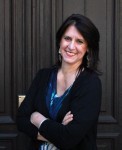 SUSAN COTTRELL is a national speaker, teacher, and counselor with years of Biblical study and discipleship experience. Her books include: Mom, I’m Gay – Loving Your LGBTQ Child Without Sacrificing Your Faith, as well as How Not to Lose Your Teen and The Marriage Renovation. Through her nonprofit organization – FreedHearts.org – Susan champions the LGBTQ community and families with her characteristic tender-heartedness, and she zealously challenges Christians who reject them with her wise insistence that “loving God and loving others” are the foundation of the rest of the scripture, just as Jesus said.
SUSAN COTTRELL is a national speaker, teacher, and counselor with years of Biblical study and discipleship experience. Her books include: Mom, I’m Gay – Loving Your LGBTQ Child Without Sacrificing Your Faith, as well as How Not to Lose Your Teen and The Marriage Renovation. Through her nonprofit organization – FreedHearts.org – Susan champions the LGBTQ community and families with her characteristic tender-heartedness, and she zealously challenges Christians who reject them with her wise insistence that “loving God and loving others” are the foundation of the rest of the scripture, just as Jesus said.
She is the Vice-President of PFLAG Austin, and her “Mom, I’m Gay” book has been endorsed by The Human Rights Campaign and others.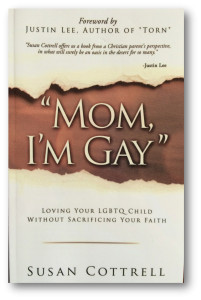 Sharon Groves, PhD, HRC’s Religion & Faith Program Director says, “I often get asked by parents for resources that can address the struggles of raising LGBT sons and daughters without having to leave faith behind. Susan Cottrell’s book, Mom, I’m Gay, does just that. This is the kind of book that parents will love.”
Sharon Groves, PhD, HRC’s Religion & Faith Program Director says, “I often get asked by parents for resources that can address the struggles of raising LGBT sons and daughters without having to leave faith behind. Susan Cottrell’s book, Mom, I’m Gay, does just that. This is the kind of book that parents will love.”
She and her husband have been married more than 25 years and have five children – one of whom is in the LGBTQ community. She lives in Austin, Texas, and blogs at FreedHearts.org and here in IMPACT Magazine’s FreedHearts and Jesus Blog columns.
(c) Susan Cottrell, 2013, FreedHearts Ministries
 Tags:
Tags: Del.icio.us


TweetThis

Digg

StumbleUpon

Comments: 0 (Zero), Be the first to leave a reply!You might be interested in this:
 A Lesson from Fred Phelps. And it’s not what you think!
A Lesson from Fred Phelps. And it’s not what you think! Why is Life so Hard?!
Why is Life so Hard?! Keeping Up Appearances
Keeping Up Appearances Going Gay
Going Gay Book Review: A Life of Unlearning One Man's Journey to Find the Truth (Audiobook) by Anthony Venn-BrownCopyright © Tim Rymel [Guest Post: To Christian Parents of Gay Children, by Susan Cottrell], All Right Reserved. 2014.
Book Review: A Life of Unlearning One Man's Journey to Find the Truth (Audiobook) by Anthony Venn-BrownCopyright © Tim Rymel [Guest Post: To Christian Parents of Gay Children, by Susan Cottrell], All Right Reserved. 2014.The post Guest Post: To Christian Parents of Gay Children, by Susan Cottrell appeared first on Tim Rymel.





